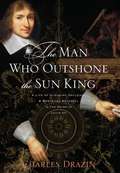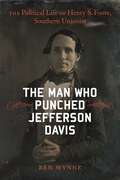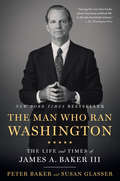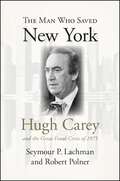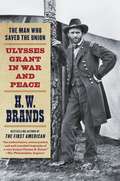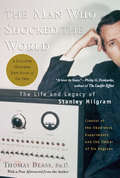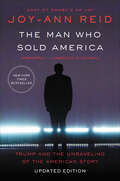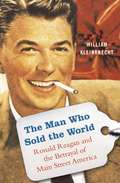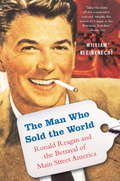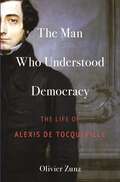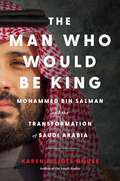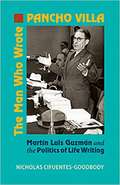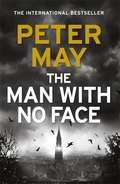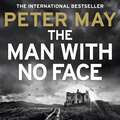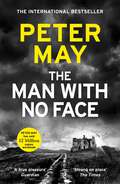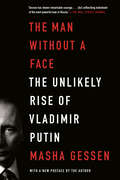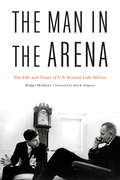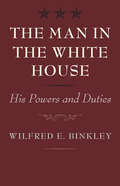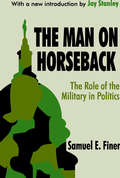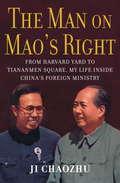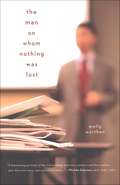- Table View
- List View
The Man Who Outshone the Sun King: A Life of Gleaming Opulence and Wretched Reversal in the Reign of Louis XIV
by Charles DrazinA richly textured biography of seventeenth-century minister Nicolas Fouquet, whose cunning and charisma brought him vast wealth and wide-ranging fame and, eventually, his own destruction
The Man Who Punched Jefferson Davis: The Political Life of Henry S. Foote, Southern Unionist (Southern Biography Series)
by Ben WynneRegarded as one of the most vocal, well-traveled, and controversial statesmen of the nineteenth century, antebellum politician Henry Stuart Foote played a central role in a vast array of pivotal events. Despite Foote’s unique mark on history, until now no comprehensive biography existed. Ben Wynne fills this gap in his examination of the life of this gifted and volatile public figure in The Man Who Punched Jefferson Davis: The Political Life of Henry S. Foote, Southern Unionist.An eyewitness to many of the historical events of his lifetime, Foote, an opinionated native Virginian, helped to raise money for the Texas Revolution, provided political counsel for the Lone Star Republic’s leadership before annexation, and published a 400-page history of the region. In 1847, Mississippi elected him to the Senate, where he promoted cooperation with the North during the Compromise of 1850. One of the South’s most outspoken Unionists, he infuriated many of his southern colleagues with his explosive temperament and unorthodox ideas that quickly established him as a political outsider. His temper sometimes led to physical altercations, including at least five duels, pulling a gun on fellow senator Thomas Hart Benton during a legislative session, and engaging in run-ins with other politicians—notably a fistfight with his worst political enemy, Jefferson Davis. He left the Senate in 1851 to run for governor of Mississippi on a pro-Union platform and defeated Davis by a small margin. Several years later, Foote moved to Nashville, was elected to the Confederate Congress after Tennessee seceded, and continued his political sparring with the Confederate president.From Foote’s failed attempt to broker an unauthorized peace agreement with the Lincoln government and his exile to Europe to the publication of his personal memoir and his appointment as director of the United States mint in New Orleans, Wynne constructs an entertaining and nuanced portrait of a singular man who constantly challenged the conventions of southern and national politics.
The Man Who Ran Washington: The Life and Times of James A. Baker III
by Peter Baker Susan GlasserFrom two of America's most revered political journalists comes the definitive biography of legendary White House chief of staff and secretary of state James A. Baker III: the man who ran Washington when Washington ran the world. <P><P>For a quarter-century, from the end of Watergate to the aftermath of the Cold War, no Republican won the presidency without his help or ran the White House without his advice. James Addison Baker III was the indispensable man for four presidents because he understood better than anyone how to make Washington work at a time when America was shaping events around the world. The Man Who Ran Washington is a page-turning portrait of a power broker who influenced America's destiny for generations. <P><P>A scion of Texas aristocracy who became George H. W. Bush's best friend on the tennis courts of the Houston Country Club, Baker had never even worked in Washington until a devastating family tragedy struck when he was thirty-nine. Within a few years, he was leading Gerald Ford's campaign and would go on to manage a total of five presidential races and win a sixth for George W. Bush in a Florida recount. He ran Ronald Reagan's White House and became the most consequential secretary of state since Henry Kissinger. He negotiated with Democrats at home and Soviets abroad, rewrote the tax code, assembled the coalition that won the Gulf War, brokered the reunification of Germany and helped bring a decades-long nuclear superpower standoff to an end. Ruthlessly partisan during campaign season, Baker governed as the avatar of pragmatism over purity and deal-making over division, a lost art in today's fractured nation. <P><P>His story is a case study in the acquisition, exercise, and preservation of power in late twentieth-century America and the story of Washington and the world in the modern era--how it once worked and how it has transformed into an era of gridlock and polarization. This masterly biography by two brilliant observers of the American political scene is destined to become a classic. <P><P><b>A New York Times Bestseller</b>
The Man Who Saved New York: Hugh Carey and the Great Fiscal Crisis of 1975 (Excelsior Editions)
by Seymour P. Lachman Robert PolnerWinner of the 2011 Empire State History Book Award presented by New York State Archives Partnership TrustThe Man Who Saved New York offers a portrait of one of New York's most remarkable governors, Hugh L. Carey, with emphasis on his leadership during the fiscal crisis of 1975. In this dramatic and colorful account, Seymour P. Lachman and Robert Polner's examine Carey's youth, military service, and public career against the backdrop of a changing, challenged, and recession-battered city, state, and nation.It was Carey's leadership, Lachman and Polner argue, that helped rescue the city and state from the brink of financial and social ruin. While TV comedians mocked and tabloids shrieked about the Big Apple's rising muggings, its deteriorating public services, and the threats and walkouts by embattled police, firefighters, and teachers, all amid a brutal recession, Carey and his team managed to hold on and ultimately prevailed, narrowly preventing a huge disruption to the state, national, and global economy. At one point, the city came within a few hours of having to declare itself incapable of paying its debts and obligations, but in the end stability and consensus prevailed, and America's largest city stayed out of bankruptcy court. The center held.Based on extensive interviews with Carey and his family, as well as numerous friends, observers, and former advisors, including Steven Berger, David Burke, John Dyson, Peter Goldmark, Judah Gribetz, Richard Ravitch, and Felix Rohatyn, The Man Who Saved New York aims to place Carey and his achievements at the center of the financial maelstrom that met his arrival in Albany. While others were willing to let the city go into default, Carey was strongly opposed, since it would not only affect the state as a whole but would have reverberations both nationally and internationally.In recounting the 1975 rescue of New York City and the aftershocks that nearly sank the state government, Lachman and Polner illuminate the often-volatile interplay among elite New York bankers, hard-nosed municipal union leaders, the press, and influential conservatives and liberals from City Hall to the Albany statehouse to the White House. Although often underappreciated by the public, it was Carey's force of will, wit, intellect, judgment, and experiences that allowed the state to survive this unparalleled ordeal and ultimately to emerge on a stronger footing. Further, Lachman and Polner argue, Carey's accomplishment is worth recalling as a prime example of how governments—local, state, and federal—can work to avoid the renewed the threat of bankruptcy that now confronts many overstretched states and localities.
The Man Who Saved the Union: Ulysses Grant in War and Peace
by H. W. BrandsFrom New York Times bestselling author H. W. Brands, a masterful biography of the Civil War general and two-term president who saved the Union twice, on the battlefield and in the White House, holding the country together at two critical turning points in our history. Ulysses Grant rose from obscurity to discover he had a genius for battle, and he propelled the Union to victory in the Civil War. After Abraham Lincoln's assassination and the disastrous brief presidency of Andrew Johnson, America turned to Grant again to unite the country, this time as president. In Brands's sweeping, majestic full biography, Grant emerges as a heroic figure who was fearlessly on the side of right. He was a beloved commander in the field but willing to make the troop sacrifices necessary to win the war, even in the face of storms of criticism. He worked valiantly to protect the rights of freedmen in the South; Brands calls him the last presidential defender of black civil rights for nearly a century. He played it straight with the American Indians, allowing them to shape their own fate even as the realities of Manifest Destiny meant the end of their way of life. He was an enormously popular president whose memoirs were a huge bestseller; yet within decades of his death his reputation was in tatters, the victim of Southerners who resented his policies on Reconstruction. In this page-turning biography, Brands now reconsiders Grant's legacy and provides a compelling and intimate portrait of a man who saved the Union on the battlefield and consolidated that victory as a resolute and principled political leader.
The Man Who Shocked The World: The Life and Legacy of Stanley Milgram
by Thomas BlassCreator of the famous Obedience Experiments and originator of the ?six degrees of separationOCO theory, Stanley Milgram transformed our understanding of human nature and continues to be one of the most important figures in psychology and beyond. In this sparkling biography, Thomas Blass captures the colorful personality and pioneering work of a visionary scientist who revealed the hidden workings of our social world. In this new paperback edition, he includes an afterword connecting MilgramOCOs theories to torture, war crimes, and Abu Ghraib. "
The Man Who Sold America: Trump and the Unraveling of the American Story
by Joy-Ann ReidWITH WIT AND PIERCING INSIGHT, JOY-ANN REID CALCULATES THE TRUE PRICE OF THE TRUMP PRESIDENCYIs Donald Trump running the “longest con” in U.S. history? What will be left of America when he leaves office?Candidate Trump sold Americans a vision that was seemingly at odds with their country’s founding principles. Now in office, he’s put up a for sale sign—on the prestige of the presidency, on America’s global stature, and on our national identity. At what cost have these deals come? Joy-Ann Reid’s The Man Who Sold America delivers an urgent accounting of our national crisis from one of our foremost political commentators. Three years ago, Donald Trump pitched millions of voters on the idea that their country was broken, and that the rest of the world was playing us “for suckers.” All we needed to fix this was Donald Trump, who rebranded prejudice as patriotism, presented diversity as our weakness, and promised that money really could make the world go ’round. Trump made the sale to just enough Americans in three key swing states to win the Electoral College. As president, Trump’s raft of self-dealing, scandal, and corruption has overwhelmed the national conversation. And with prosecutors bearing down on Trump and his family business, the web of criminality is circling closer to the Oval Office. All this while Trump seemingly makes his administration a pawn for the ultimate villain: an autocratic former KGB officer in Russia who found in the untutored and eager forty-fifth president the perfect “apprentice.” How did we get here? What is the hidden impact of Trump, beyond the headlines? Joy-Ann Reid’s essential book examines why he succeeded, and whether America can undo the damage he has done. Through interviews with American and international thought leaders and in-depth analysis, Reid situates the Trump era within the context of modern history, examining the profound social changes that led us to this point. A deeply pertinent analysis, The Man Who Sold America reveals the causes and consequences of the Trump presidency and contends with the future that awaits us.
The Man Who Sold the World: Ronald Reagan and the Betrayal of Main Street America
by William KleinknechtSince Ronald Reagan left office--and particularly after his death--his shadow has loomed large over American politics: Republicans and many Democrats have waxed nostalgic, extolling the Republican tradition he embodied, the optimism he espoused, and his abilities as a communicator. This carefully calibrated image is complete fiction, argues award-winning journalist William Kleinknecht. The Reagan presidency was epoch shattering, but not--as his propagandists would have it--because it invigorated private enterprise or made America feel strong again. His real legacy was the dismantling of an eight-decade period of reform in which working people were given an unprecedented sway over our politics, our economy, and our culture. Reagan halted this almost overnight.In the tradition of Thomas Frank's What's the Matter with Kansas?, Kleinknecht explores middle America--starting with Reagan's hometown of Dixon, Illinois--and shows that as the Reagan legend grows, his true legacy continues to decimate middle America.
The Man Who Sold the World: Ronald Reagan and the Betrayal of Main Street America
by William KleinknechtSince Ronald Reagan left office-and particularly after his death-his shadow has loomed large over American politics: Republicans and many Democrats have waxed nostalgic, extolling the Republican tradition he embodied, the optimism he espoused, and his abilities as a communicator. This carefully calibrated image is complete fiction, argues award-winning journalist William Kleinknecht. The Reagan presidency was epoch shattering, but not-as his propagandists would have it-because it invigorated private enterprise or made America feel strong again. His real legacy was the dismantling of an eight-decade period of reform in which working people were given an unprecedented sway over our politics, our economy, and our culture. Reagan halted this almost overnight. In the tradition of Thomas Frank’s What’s the Matter with Kansas?, Kleinknecht explores middle America-starting with Reagan’s hometown of Dixon, Illinois-and shows that as the Reagan legend grows, his true legacy continues to decimate middle America.
The Man Who Understood Democracy: The Life of Alexis de Tocqueville
by Olivier ZunzA definitive biography of the French aristocrat who became one of democracy’s greatest championsIn 1831, at the age of twenty-five, Alexis de Tocqueville made his fateful journey to America, where he observed the thrilling reality of a functioning democracy. From that moment onward, the French aristocrat would dedicate his life as a writer and politician to ending despotism in his country and bringing it into a new age. In this authoritative and groundbreaking biography, leading Tocqueville expert Olivier Zunz tells the story of a radical thinker who, uniquely charged by the events of his time, both in America and France, used the world as a laboratory for his political ideas.Placing Tocqueville’s dedication to achieving a new kind of democracy at the center of his life and work, Zunz traces Tocqueville’s evolution into a passionate student and practitioner of liberal politics across a trove of correspondence with intellectuals, politicians, constituents, family members, and friends. While taking seriously Tocqueville’s attempts to apply the lessons of Democracy in America to French politics, Zunz shows that the United States, and not only France, remained central to Tocqueville’s thought and actions throughout his life. In his final years, with France gripped by an authoritarian regime and America divided by slavery, Tocqueville feared that the democratic experiment might be failing. Yet his passion for democracy never weakened.Giving equal attention to the French and American sources of Tocqueville’s unique blend of political philosophy and political action, The Man Who Understood Democracy offers the richest, most nuanced portrait yet of a man who, born between the worlds of aristocracy and democracy, fought tirelessly for the only system that he believed could provide both liberty and equality.
The Man Who Would Be King: Mohammed bin Salman and the Transformation of Saudi Arabia
by Karen Elliott HouseBased on exclusive interviews, an eye-opening biography of Crown Prince Mohammed bin Salman (MBS), head of the House of Saud, the calculating ruler of the Kingdom of Saudi Arabia, and a central Middle East power broker.Pulitzer Prize-winning reporter and former Wall Street Journal publisher, Karen House has gained unprecedented insights into Saudi Arabia and its controversial leader, Crown Prince Mohammed bin Salman through her more than forty years of experience covering the Arab kingdom.House reveals a leader who like Peter the Great, is a reformer determined to modernize his kingdom but also an autocrat who jails political opponents and rival princes to assure his grip on power. Drawing on extensive interviews with the Crown Prince, his royal relatives, and his inner ring of advisors, The Man Who Would Be King explains in full what shaped the man who is reshaping Saudi Arabia.Drawing on fresh, headline-making reporting, House balances both sides of this complex ruler. We are introduced to MBS the visionary, who has ushered in reforms for women to participate more equitably, encouraged tourism to the Kingdom, and placed long term bets on green energy and trillion dollar mega-projects like The Line, a hundred-mile-long enclosed futuristic city in the desert that will be run by AI. And we meet MBS the Machiavellian prince, widely accused of having Washington Post columnist and Saudi dissident Jamal Khashoggi murdered, and of sports washing the kingdom's reputation by investing billions in teams globally, from Premiere League soccer to the LIV (liv) golf tour to the World Cup which the Kingdom will host in 2034.The Man Who Would Be King reveals MBS in all his complexities, from his rise to power and his vision for the future of his Kingdom, to his ruthless maneuvers to project power—a shrewd broker working to seal a viable deal with Israel and bring peace to Gaza while he cuts oil supplies to manipulate Western politics. It is an unprecedent and much needed in-depth portrait of the leader who, at only thirty-nine, will be a major player on the world stage for the next half century.
The Man Who Would Be President: Dan Quayle
by Bob Woodward David S. BroderAn assessment widely credited at the time.
The Man Who Wrote Pancho Villa: Martin Luis Guzman and the Politics of Life Writing
by Nicholas Cifuentes-GoodbodyMartin Luis Guzman was many things throughout his career in twentieth-century Mexico: a soldier in Pancho Villa's revolutionary army, a journalist-in-exile, one of the most esteemed novelists and scholars of the revolutionary era, and an elder statesman and politician. In The Man Who Wrote Pancho Villa, we see the famous author as he really was: a careful craftsman of his own image and legacy. His five-volume biography of Villa propelled him to the heights of Mexican cultural life, and thus began his true life's work. Nicholas Cifuentes-Goodbody shapes this study of Guzman through the lens of "life writing" and uncovers a tireless effort by Guzman to shape his public image.The Man Who Wrote Pancho Villa places Guzman's work in a biographical context, shedding light on the immediate motivations behind his writing in a given moment and the subsequent ways in which he rewrote or repackaged the material. Despite his efforts to establish a definitive reading of his life and literature, Guzman was unable to control that interpretation as audiences became less tolerant of the glaring omissions in his self-portrait.
The Man Who Wrote Pancho Villa: Martin Luis Guzman and the Politics of Life Writing
by Nicholas Cifuentes-GoodbodyMartin Luis Guzman was many things throughout his career in twentieth-century Mexico: a soldier in Pancho Villa's revolutionary army, a journalist-in-exile, one of the most esteemed novelists and scholars of the revolutionary era, and an elder statesman and politician. In The Man Who Wrote Pancho Villa, we see the famous author as he really was: a careful craftsman of his own image and legacy. His five-volume biography of Villa propelled him to the heights of Mexican cultural life, and thus began his true life's work. Nicholas Cifuentes-Goodbody shapes this study of Guzman through the lens of "life writing" and uncovers a tireless effort by Guzman to shape his public image.The Man Who Wrote Pancho Villa places Guzman's work in a biographical context, shedding light on the immediate motivations behind his writing in a given moment and the subsequent ways in which he rewrote or repackaged the material. Despite his efforts to establish a definitive reading of his life and literature, Guzman was unable to control that interpretation as audiences became less tolerant of the glaring omissions in his self-portrait.
The Man With No Face
by Peter MayA classic early novel from Peter May situated among the political intrigue of Brussels, Belgium, in 1979--now available in the United States."Peter May is a writer I'd follow to the ends of the earth." --Marilyn Stasio, New York Times There are two men on their way to Brussels from the UK: Neil Bannerman, an iconoclastic journalist for Scotland's Daily Standard whose irate editor wants him out of the way, and Kale--a professional assassin.Expecting to find only a difficult, dreary political investigation in Belgium, Bannerman has barely settled in when tragedy strikes. His host, a fellow journalist, along with a British Cabinet minister, are discovered dead in the minister's elegant Brussels townhouse. It appears that they have shot each other. But the dead journalist's young autistic daughter, Tania, was hidden in a closet during the killings, and when she draws a chilling picture of a third party--a man with no face--Bannerman suddenly finds himself a reluctant participant in a desperate murder investigation.As the facts slowly begin to emerge under Bannerman's scrutiny, he comes to suspect that the shootings may have a deep and foul link with the rotten politics that brought him to Brussels in the first place. And as Kale threatens to strike again, Bannerman begins to feel a change within himself. His jaded professionalism is transforming into a growing concern for the lonely and frightened Tania, and a strong attraction to a courageous woman named Sally--drawing him out of himself and into the very heart of a profound, cold-blooded, and infinitely dangerous conspiracy.
The Man With No Face: A powerful and prescient crime thriller from the author of The Lewis Trilogy
by Peter May**THE SUNDAY TIMES BESTSELLER****FROM THE AUTHOR OF THE LEWIS TRILOGY, CAST IRON, AND I'LL KEEP YOU SAFE****PETER MAY: OVER 3 MILLION COPIES SOLD**Can evil be unmasked before it's too late . . . ?A REPORTER WITH NO FEAR1979. Jaded Edinburgh journalist Neil Bannerman is sent to Europe, intent on digging up dirt. Yet it is danger he discovers, when two British men are found murdered.A CHILD WITH NO FATHEROne victim is a journalist, the other a Cabinet Minister: the double-assassination witnessed by the former's autistic daughter. This girl recalls every detail about her father's killer - except for one.THE MAN WITH NO FACEWith those around him rocked by the tragedy, Bannerman is compelled to follow his instincts. He is now fighting to expose a murderous conspiracy, protect a helpless child, and unmask a remorseless killer.LOVED THE MAN WITH NO FACE? Read Peter May's newly reissued thriller, THE NOBLE PATHLOVE PETER MAY? Order his new thriller, A SILENT DEATH(P)2019 Quercus Editions Limited
The Man With No Face: the powerful and prescient Sunday Times bestseller
by Peter May**THE SUNDAY TIMES BESTSELLER****FROM THE AUTHOR OF THE LEWIS TRILOGY, CAST IRON, AND I'LL KEEP YOU SAFE****PETER MAY: OVER 3 MILLION COPIES SOLD**Can evil be unmasked before it's too late . . . ?A REPORTER WITH NO FEAR1979. Jaded Edinburgh journalist Neil Bannerman is sent to Europe, intent on digging up dirt. Yet it is danger he discovers, when two British men are found murdered.A CHILD WITH NO FATHEROne victim is a journalist, the other a Cabinet Minister: the double-assassination witnessed by the former's autistic daughter. This girl recalls every detail about her father's killer - except for one.THE MAN WITH NO FACEWith those around him rocked by the tragedy, Bannerman is compelled to follow his instincts. He is now fighting to expose a murderous conspiracy, protect a helpless child, and unmask a remorseless killer.LOVED THE MAN WITH NO FACE? Read Peter May's newly reissued thriller, THE NOBLE PATHLOVE PETER MAY? Order his new thriller, A SILENT DEATH
The Man With No Face: the powerful and prescient Sunday Times bestseller
by Peter May**THE SUNDAY TIMES BESTSELLER****FROM THE AUTHOR OF THE LEWIS TRILOGY, CAST IRON, AND I'LL KEEP YOU SAFE****PETER MAY: OVER 3 MILLION COPIES SOLD**Can evil be unmasked before it's too late . . . ?A REPORTER WITH NO FEAR1979. Jaded Edinburgh journalist Neil Bannerman is sent to Europe, intent on digging up dirt. Yet it is danger he discovers, when two British men are found murdered.A CHILD WITH NO FATHEROne victim is a journalist, the other a Cabinet Minister: the double-assassination witnessed by the former's autistic daughter. This girl recalls every detail about her father's killer - except for one.THE MAN WITH NO FACEWith those around him rocked by the tragedy, Bannerman is compelled to follow his instincts. He is now fighting to expose a murderous conspiracy, protect a helpless child, and unmask a remorseless killer.LOVED THE MAN WITH NO FACE? Read Peter May's newly reissued thriller, THE NOBLE PATHLOVE PETER MAY? Order his new thriller, A SILENT DEATH
The Man Without a Face: The Unlikely Rise of Vladimir Putin
by Masha GessenThe Man Without a Face is the chilling account of how a low- level, small-minded KGB operative ascended to the Russian presidency and, in an astonishingly short time, destroyed years of progress and made his country once more a threat to her own people and to the world. Handpicked as a successor by the "family" surrounding an ailing and increasingly unpopular Boris Yeltsin, Vladimir Putin seemed like a perfect choice for the oligarchy to shape according to its own designs. Suddenly the boy who had stood in the shadows, dreaming of ruling the world, was a public figure, and his popularity soared. Russia and an infatuated West were determined to see the progressive leader of their dreams, even as he seized control of media, sent political rivals and critics into exile or to the grave, and smashed the country's fragile electoral system, concentrating power in the hands of his cronies. As a journalist living in Moscow, Masha Gessen experienced this history firsthand, and for The Man Without a Face she has drawn on information and sources no other writer has tapped. Her account of how a "faceless" man maneuvered his way into absolute-and absolutely corrupt-power has the makings of a classic of narrative nonfiction. .
The Man in the Arena: The Life and Times of U.S. Senator Gale McGee
by Alan K. Simpson Rodger McDanielThere was a time when Wyoming and other Rocky Mountain and midwestern states were as likely to elect a liberal Democrat to Congress as they were a conservative Republican. Gale McGee (1915–92) was elected to the U.S. Senate in 1958, at the height of American liberalism. He typified what Teddy Roosevelt called “the man in the arena” and was a major player in the development of America’s post–World War II foreign policy and almost every legislative milestone in U.S. history from the 1950s to 1980. McGee’s careers as an academic, a senator, and an ambassador spanned World War II, the Red Scare, the Korean and Vietnam Wars, and the activist Congress of the 1960s. This elegantly conceived biography of a liberal from the conservative rural state of Wyoming offers readers a glimpse into formative political shifts of the twentieth century. The national liberal consensus of the 1960s, in which McGee played a major role, gave the nation Social Security, Medicare, Medicaid, the minimum wage, and the right to collective bargaining, as well as landmark civil rights and environmental reforms. That consensus had ended by the mid-1970s as McGee’s liberalism would no longer be welcome to represent the Equality State. Moving beyond biography, Rodger McDaniel addresses the significant shift in government and details how the attribution “liberal” became a candidate’s epitaph, as widespread distrust of government cast a shadow on the many benefits acquired through the old liberal consensus. McDaniel’s insights into the past as well as McGee’s experiences in the arena shed unexpected light on the present state of U.S. politics and government.
The Man in the White House: His Powers and Duties
by Wilfred E. BinkleyThe Constitution of the United States says little about the president's specific duties other than the enforcement of the laws of the land. Combining brilliant scholarship with a lively style, this book reveals how deep-seated forces, inherent in American society and affecting the presidency for over two centuries, have transformed the office created by the framers of the Constitution into the complex, powerful, and responsible institution it is today.The administrations of the "strong" presidents have added to the powers and duties of the office as we know them. In addition, such social and political forces as the growth of political parties, economic and geographic expansion, and the changing nature of the national government have all had their influence on the presidency. These processes are historically traced by the author and illustrated by vivid examples of how they worked in the case of such holders of the office as Washington, Jackson, Polk, Lincoln, the two Roosevelts, and Eisenhower.Every chapter of the book brings a fresh and authoritative approach to an office and an institution that is the subject of searching debates today.
The Man in the White House: His Powers and Duties
by Wilfred E. Binkley“Mr. Binkley’s interpretations . . . of the Presidency have deservedly been of great influence; and the reasons are evident to the reader of this book.” —The Journal of PoliticsThe Constitution of the United States says little about the president’s specific duties other than the enforcement of the laws of the land. Combining brilliant scholarship with a lively style, this book reveals how deep-seated forces, inherent in American society and affecting the presidency for over two centuries, have transformed the office created by the framers of the Constitution into the complex, powerful, and responsible institution it is today.The administrations of the “strong” presidents have added to the powers and duties of the office as we know them. In addition, such social and political forces as the growth of political parties, economic and geographic expansion, and the changing nature of the national government have all had their influence on the presidency. These processes are historically traced by the author and illustrated by vivid examples of how they worked in the case of such holders of the office as Washington, Jackson, Polk, Lincoln, the two Roosevelts, and Eisenhower.Every chapter of the book brings a fresh and authoritative approach to an office and an institution that is the subject of searching debates today.“Into it he has put all the insight and charm and sense of proportion that have marked each of his remarkable books on American institutions . . . The importance of the presidency in molding our politics and of politics as a weapon of the successful President have never been stated more clearly and conclusively than in these chapters.” —The American Historical Review
The Man on Horseback: The Role of the Military in Politics
by Samuel FinerThe role of the military in a society raises a number of issues: How much separation should there be between a civil government and its army? Should the military be totally subordinate to the polity? Or should the armed forces be allowed autonomy in order to provide national security? Recently, the dangers of military dictatorships-as have existed in countries like Panama, Chile, and Argentina-have become evident. However, developing countries often lack the administrative ability and societal unity to keep the state functioning in an orderly and economically feasible manner without military intervention.Societies, of course, have dealt with the realities of these problems throughout their histories, and the action they have taken at any particular point in time has depended on numerous factors. In the ""first world"" of democratic countries, the civil-military relationship has been thoroughly integrated, and indeed by most modern standards this is seen as essential. However, several influential Western thinkers have developed theories arguing for the separation of the military from any political or social role. Samuel Huntington, emphasized that professionalism would presuppose that the military should intervene as little as possible in the political sphere. Samuel E. Finer, in contrast, emphasizes that a government can be efficient enough way to keep the civil-military relationship in check, ensuring that the need for intervention by the armed forces in society would be minimal. At the time of the book's original publication, perhaps as a consequence of a post-World War II Cold War atmosphere, this was by no means a universally accepted position. Some considered the military to be a legitimate threat to a free society. Today's post-Cold War environment is an appropriate time to reconsider Finer's classic argument.The Man on Horseback continues to be an important contribution to the study of the military's role in the realm of politics, and will be of interest to stu
The Man on Mao's Right
by Ji ChaozhuNo other narrative from within the corridors of power has offered as frank and intimate an account of the making of the modern Chinese nation as Ji Chaozhu’sThe Man on Mao’s Right. Having served Chairman Mao Zedong and the Communist leadership for two decades, and having become a key figure in China’s foreign policy, Ji now provides an honest, detailed account of the personalities and events that shaped today’s People’s Republic. The youngest son of a prosperous government official, nine-year-old Ji and his family fled Japanese invaders in the late 1930s, escaping to America. Warmly received by his new country, Ji returned its embrace as he came of age in New York’s East Village and then attended Harvard University. But in 1950, after years of enjoying a life of relative ease while his countrymen suffered through war and civil strife, Ji felt driven by patriotism to volunteer to serve China in its conflict with his adoptive country in the Korean War. Ji’s mastery of the English language and American culture launched his improbable career, eventually winning him the role of English interpreter for China’s two top leaders: Premier Zhou Enlai and Party Chairman Mao Zedong. With a unique blend of Chinese insight and American candor, Ji paints insightful portraits of the architects of modern China: the urbane, practical, and avuncular Zhou, the conscience of the People’s Republic; and the messianic, charismatic Mao, student of China’s ancient past–his country’s stern father figure. In Ji’s memoir, he is an eyewitness to modern Chinese history, including the Great Leap Forward, the Cultural Revolution, the Nixon summit, and numerous momentous events in Tiananmen Square. As he becomes caught up in political squabbles among radical factions, Ji’s past and charges against him of “incorrect” thinking subject him to scrutiny and suspicion. He is repeatedly sent to a collective farm to be “reeducated” by the peasants. After the Mao years, Ji moves on to hold top diplomatic posts in the United States and the United Kingdom and then serves as under secretary-general of the United Nations. Today, he says, “The Chinese know America better than the Americans know China. The risk is that we misperceive each other. ” This highly accessible insider’s chronicle of a struggling people within a developing powerhouse nation is also Ji Chaozhu’s dramatic personal story, certain to fascinate and enlighten Western readers. A riveting biography and unique historical record,The Man on Mao’s Rightrecounts the heartfelt struggle of a man who loved two powerful nations that were at odds with each other. Ji Chaozhu played an important role in paving the way for what is destined to be known as the Chinese Century. Praise forThe Man on Mao’s Right "Brave, beautifully written testimony . A true "fly-on-the-wall" account of the momentous changes in Chinese society and international relations over the last century. " --Kirkus Reviews “It is a relief to read an account by an urbane and often witty insider who neither idolizes nor demonizes China's top leaders . . . . Highly recommended. "—Library Journal, starred review
The Man on Whom Nothing Was Lost: The Grand Strategy of Charles Hill
by Molly WorthenPsychologically astute and passionately written, Molly Worthen’s remarkable debut charts the intricate relationship between student and teacher, biographer and subject. As a Yale freshman, Worthen found herself deeply fascinated by worldly-wise professor Charles Hill, a former diplomat who had shaped American foreign policy in his forty-year career as an adviser to Henry Kissinger, George Shultz, and Boutros Boutros-Ghali, among others. Hill was never afraid to tell students how to think or what to do, and the Grand Strategy seminar he co-taught had developed a cult following.The Man on Whom Nothing Was Lost is at once the biography of a political insider and the story of how its author evolved as she wrote it. In a moving, highly original work, Worthen conveys the joy and the heartache of uncovering the human being behind one’s idol.
